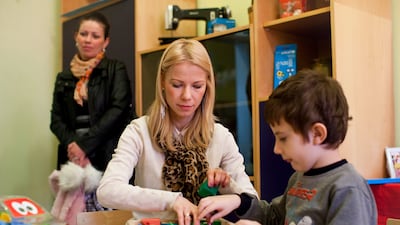Saturday marks the 15th annual World Autism Awareness Day, an occasion established by the UN to boost recognition of the condition.
In the years that have passed, important progress has been made in increasing public understanding of autism.
While the meaning of the term autism has changed radically in the more than a century since the word was coined, today educators are often keen that it is not seen as a disorder.
In recent years, a broader definition of what it means to be autistic has resulted in an increase in the number of people diagnosed, at least in some nations.
Figures from the Centres for Disease Control and Prevention in the US, for example, indicate that as many as one in 44 children is on the autistic spectrum. In the same vein, between 1998 and 2018, the number of people in the UK diagnosed with autism jumped 20-fold.
“There’s better awareness of autism and more people know how to identify, diagnose and assess,” said Prof Karen Guldberg, professor of autism studies at the University of Birmingham in the UK.
Sometimes described as a disorder, sometimes as a condition, sometimes as a characteristic, autism is associated with difficulties in social communication and rigid and repetitive behaviours. But it manifests itself in many ways and is highly diverse.
Cutting through the stereotypes
“Simply because somebody has autism, it doesn’t mean they will fit with the stereotype we have of Rain Man,” said Dr Prithvi Perepa, a lecturer in autism also at the University of Birmingham.
Rain Man was a celebrated 1988 film in which Dustin Hoffman starred as Raymond, an autistic man with special talents. Tom Cruise played his brother.
While the media often features autistic individuals with special artistic or musical skills, Dr Perepa said these were found in only about three per cent of autistic people.
Yet while autistic people are “as individual as you or I”, Prof Guldberg said. “we should celebrate the strengths of autistic people”.
“Many autistic people have really good attention to detail,” she said. “Many are visual thinkers, and are truthful and honest. Often autistic people create strong and loyal bonds to the people they’re close to.
“There’s a lot of myths we have to debunk. People say they don’t create bonds, they don’t have emotional intelligence, they aren’t able to empathise. A lot of that is not the case.”
For parents, there are a number of indicators that their child may be autistic. Dr Perepa said the child may not develop speech normally, or may be speaking in an unusual way that involves repeating words.
The child may be more at ease interacting with adults but find it difficult to socialise with children of his or her own age.
“Parents still sometimes go for a hearing test because they feel the child isn’t able to hear because the child is not responding,” he said.
A key message for parents whose child is autistic is, said Dr Perepa, that the child is still able to develop. The internet can, he noted, be full of negative information that makes parents feel there is little point in trying to help their child to learn.
“Children with autism are capable of learning like any other children,” he said. “What’s important is understanding what’s interesting for the child.
“What’s hard [for the child] is not realising why they have to do certain things, like communicate with somebody.”
A difference, not a disorder
In modern times there has been a move away from medicalising or pathologising autism and seeing it, instead, as a difference rather than a disorder or even a condition. This is something, said Prof Guldberg, that autistic people themselves say is important.
“It doesn’t help to present people as faulty,” she said. “It has an impact on their self esteem … It’s important to accept difference and … we cannot adequately support the autistic person if we don’t understand how they function in the world.”
It is not, she adds, about failing to acknowledge that autism does not pose significant difficulties for some people, but is instead about recognising that autistic people have strengths that can be built upon.
“Often we need to adapt the way we communicate and interact in order for that person to get the most out of their education and life generally,” said Prof Guldberg.
“It’s not so much awareness; it’s more about acceptance. Once we accept, understand and celebrate differences, we can be better at making the world a better place for these people.”
This approach has not been adopted universally. In particular, Dr Perepa, who has helped to develop a national autism strategy in Oman, said that in the Middle East what may be seen as old-fashioned attitudes to autism may be more common.
“We need to make some accommodations as society and learn some skills. It’s a paradigm shift,” he said. “That may not necessarily be translated to Middle Eastern countries, where the approach is medicalised, trying to make the child behave a bit more normal.”
As more autistic people have been diagnosed as the definition has widened and awareness has increased, the proportion of autistic people who are being educated in mainstream schools has grown in some nations.
Today, about 72 per cent of autistic people of school age in England are in mainstream education, a number that includes many individuals who in previous generations would have gone undiagnosed. Around 30 to 40 per cent of autistic people may have a co-occurring learning difficulty.
Gender gap in autism diagnosis
Another notable statistic is that for every girl diagnosed with autism, more than four boys are recognised as being autistic. The extent to which this reflects differences in biology or biases in clinicians is a subject for debate.
“There seems to be to some extent a biological component, which may be due to genetic and brain differences,” said Dr Punit Shah, an associate professor of psychology at the University of Bath in the UK.
Dr Ateeq Qureshi, lead child and adolescent psychiatrist at the Priory Wellbeing Centre in Dubai and Abu Dhabi, said girls may be misdiagnosed with other conditions such as obsessive-compulsive disorder, attention deficit hyperactivity disorder, anxiety, anorexia or borderline personality disorder. These may coexist with autism.
“Girls are far more likely to internalise, mask or camouflage their symptoms,” he said. “They are also more likely to have an interest in social interaction even if they struggle with these interactions. Girls with autism show less stereotyped and restricted repetitive behaviours. This can lead parents, teachers and even doctors, to miss the signs.”
While boys on the autistic spectrum often develop interests in objects and things, the interests of girls with autism may involve people or animals, and their desire to interact socially may be greater.
But while in the past much research has tended to focus on men and boys, more recently greater effort has been made to understand autism in girls. This has resulted in more girls being diagnosed.
“The rate in females has been going up faster than in males as we understand what autism looks like [in girls],” Dr Shah said.
These changes come amid a wider improvement in how the condition is understood and perceived.
“Understandings of autism are constantly evolving and it is encouraging that so many people are accepting and celebrating autistic people and what they have to offer,” says Prof Guldberg.





















